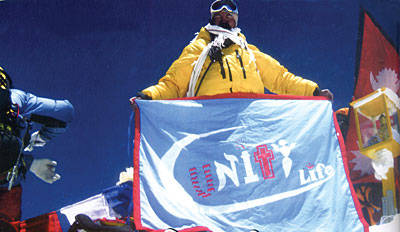 |
Once upon a time in a kingdom far away lived a generous king. One day, a sage presented him with a chessboard as a gift. The king had never seen such a thing and offered the wise man a reward of his choice. The sage asked for a grain of rice on the first square of the chessboard, two on the second, four on the third and so on, doubling the amount each time. The king, frankly insulted for having been asked for what he thought was a meagre amount, quickly agreed only to realise that he would fail to grant the sage his reward. It would have come to 18,446,744,073,709,551,615 grains of rice (roughly 62 billion metric tonnes), many times more than what the arable land on Earth can produce.
This is because of the power of exponential numbers, which is the principle by which networking businesses like Unity Life-Assurance International (which has finally been closed down) operate. They will tell you can earn money by recruiting new members to the company, but not that there are not enough people on the planet for everyone participating in such a venture to profit.
The formula was not invented yesterday, but it seems too much to expect our leaders to understand it. Therefore, they did what the complacent king would have done.
President Ram Baran Yadav presented a letter of appreciation to the head of Unity Life-Assurance International. Prime Minister Madhav Kumar Nepal presented garlands. Foreign Minister Sujata Koirala wrote a letter of recommendation hoping Unity would make its business delivery more efficient. The Minster of Commerce Rajendra Mahato lauded the creative way in which Unity was operating. Maoist politburo member Lil Bahadur Thapa said a Maoist government would adopt Unity's 'nation-building strategy' into the national five-year plan and enlist 10 million Maoist supporters as Unity members.
The masterminds behind this Ponzi scheme plastered these recommendations onto a glossy newsletter next to images of skyscrapers so they could present the package to hapless villagers, menial workers and daily wage labourers, some of whom sold their belongings and took high-interest loans to become members.
Unity sold dreams. It said it had plans to buy 300 Boeing 747s. It was going to make Nepal fuel-independent within ten years by juicing Jatropha berries. It was going to utilise the 'wasted' hydro potential of Nepal to produce 7,000 MW of electricity. "You can join us today to earn these benefits or five years later. We are going to run the country," a Unity representative told a housewife in Pokhara. "And we have endorsements from all these leaders to prove it."
For four years, while Unity duped 650,000 people into giving up almost 10 billion of their hard-earned rupees, no one bothered to check if it had the required paperwork to conduct any of these businesses. There are no regulations for networking business, they said, but what about the banking and insurance plans it was selling? If our leaders found it too difficult to understand how a Ponzi scheme works, they should have just tried the alternative, and simpler, strategy of not endorsing a business running illegally.
Networking businesses are not based on the value of the company; they feed off the value of the relationships that sell such schemes. Unity milked the trust between friends, neighbours and relatives. After banning network businesses this week, the government has said that it will prosecute Unity honchos. But in endorsing the company, government ministers and political leaders are already accomplices to their malicious deceit and should be held responsible for it.
READ ALSO:
Flex-ible, Prashant Jha
Engage the monarchy, Biraj Bahadur Bista
Politics abhors a vacuum, Publisher's Note
Ready, steady, no?, Dewan Rai
Just questions, Ashutosh Tiwari
Full circle FM, CK Lal
Two seconds to midnight, Ass
Whither constitution writing



